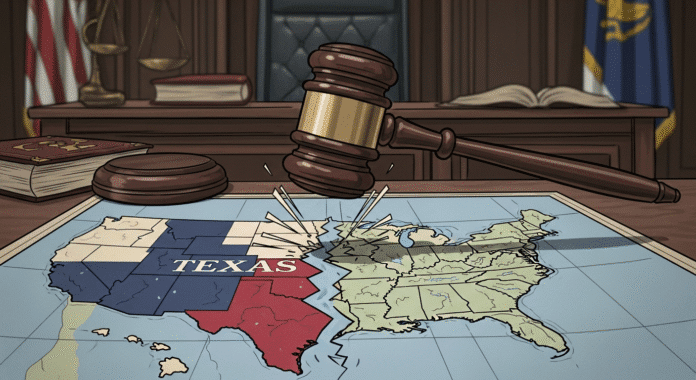Legal limits and political clashes come to a head as Illinois asserts its sovereignty in the Texas redistricting dispute
Texas Democrats made headlines when they left the state to block a contentious redistricting plan by breaking quorum. In a move that echoed past political standoffs, the absence of these lawmakers halted the process of drawing congressional districts designed to favor Republicans. An Illinois judge quickly put an end to Texas officials’ attempts to enforce arrest warrants on the Democrats by ruling that Texas law does not carry over to Illinois. This decision not only defused the immediate crisis but also set a clear legal boundary that reinforces the principles of state sovereignty and federalism. The following article unpacks the legal arguments, political implications, and historical context of this unfolding saga.
A High-Stakes Quorum-Break Tactic
The Texas Democrats’ Strategy
In a bold political maneuver, more than 60 Texas House Democrats traveled to Illinois to prevent a quorum from being reached in the Texas legislature. This strategic departure was meant to delay the GOP-backed redistricting plan that would add five new congressional seats favoring Republicans. Texas Democrats argued that the new map would undermine electoral fairness and negatively impact minority representation, while lawmakers in Houston and Austin maintained that the move was a necessary check on partisan overreach.
This deliberate quorum break is reminiscent of earlier legislative standoffs in Texas. It highlights how minority parties sometimes use dramatic tactics to disrupt legislative processes when they feel that critical democratic principles like fair representation and voting rights are at risk.
The GOP Redistricting Controversy
The redistricting plan, which stirred controversy across Texas and the nation, was a key element of the high-stakes political chess game. Proponents, including former President Donald Trump and Texas Governor Greg Abbott, argued that the new map was necessary to account for population changes and secure representation for Texas’ growing economy and infrastructure needs. Critics, however, saw it as a partisan power grab that could have long-lasting consequences for voter equality.
Governor Abbott took a particularly harsh stance, stating, “Democrats hatched a deliberate plan not to show up for work. That amounts to an abandonment or forfeiture of an elected state office.” His statement echoed frustration among Republicans who saw the quorum break as an infringement on the legislative process and a direct challenge to their authority in redistricting.
Legal Boundaries and Judicial Reasoning
The Arrest Warrants and Jurisdictional Limits
In response to the quorum break, Texas House Speaker Dustin Burrows and Attorney General Ken Paxton issued civil arrest warrants against the absent Democrats. Their goal was to compel the lawmakers to return and fulfill their legislative duties. However, when Paxton’s petition reached Illinois courts, the legal challenges quickly became evident.
Illinois Judge Scott Larson ruled that the warrant was enforceable only within Texas. He explained, “Warrants specify enforcement within Texas. Illinois courts cannot consider whether foreign legislators were evading duties, and they cannot direct enforcement of civil quorum warrants for nonresidents temporarily in Illinois.” This ruling made it clear that Texas law does not extend across state lines, effectively neutralizing the attempt to arrest the Texas Democrats in Illinois.
Principles of Federalism in Play
The decision by Judge Larson reinforces a cornerstone of American legal doctrine. Federalism grants each state the authority to manage its own affairs and enforces strict limits on the extent to which one state can intervene in another’s internal political processes. Illinois Governor J.B. Pritzker echoed this sentiment when he remarked, “Texas law does not apply in the state of Illinois, and there’s no federal law that would allow the FBI to arrest anybody that’s here visiting our state.” This clarification underscores a broader legal consensus that states must respect each other’s sovereignty, especially in political battles that cross state lines.
Critical Legal Perspectives
Legal experts have widely praised Judge Larson’s ruling for its clarity and strict adherence to constitutional principles. The ruling is seen as a reaffirmation of the limits of state power—a decision that not only protects the rights of lawmakers but also preserves the delicate balance of power between states. It serves as a precedent in a evolving legal landscape where partisan battles over redistricting and voting rights are increasingly common.
Political Ramifications and Statewide Impact
Texas Officials Stand Firm
Despite the setback in Illinois, Texas officials remain steadfast in their efforts to enforce the quorum requirement. Speaker Burrows warned that the Texas special legislative session might be adjourned if the absent Democrats did not return, and Governor Abbott has threatened fines, removal from office, and even felony charges for those who refuse to show up. These stern measures reflect the high stakes involved and a determination to assert legislative authority.
Implications for the National Debate on Gerrymandering
The redistricting fight in Texas is more than a localized dispute; it is part of a national narrative concerning fair representation and voter rights. Aggressive redistricting plans have long been a battleground between those who believe in strict party-line drawing of maps and those who advocate for a more balanced approach that respects democratic principles. Critics argue that such measures undermine the spirit of democracy by allowing partisan interests to manipulate electoral districts, whereas supporters claim that these strategies reflect legitimate political adjustments based on current demographics.
Historical Context
This is not the first time Texas Democrats have used a quorum break as a tool of political negotiation. Similar tactics have surfaced in prior legislative sessions as a response to contentious legislation. By drawing parallels with previous incidents, analysts note that while the approach is unorthodox, it is not without precedent. The tactic has served as a dramatic reminder of the lengths to which minority parties are willing to go to protect the principles of fair representation.
Voices From the Front Lines
Perspectives That Define the Moment
Statements from both sides of the issue reveal the depth of feeling surrounding this standoff. Texas Governor Greg Abbott’s uncompromising words underline the determination of those in power to uphold their version of the legislative process. In contrast, Illinois Governor J.B. Pritzker’s support for the Democrats reflects a broader concern for protecting the rights of lawmakers and ensuring that political power remains balanced.
Important voices in the legal community have also weighed in. Legal analysts have noted that the Illinois decision is a textbook example of state sovereignty in action. The refusal to enforce Texas warrants in a neighboring state sends a clear message: political disputes should be resolved within the proper legal channels rather than through extralegal means.
An illustration of this balance is found in Judge Larson’s statement: “Warrants specify enforcement within Texas.” This concise declaration encapsulates the legal limitations that both sides must navigate—a reminder that the law can serve as an impartial arbiter even in the most heated political conflicts.
The Illinois judge’s decision to block Texas officials from arresting Democrats is a pivotal moment in the ongoing redistricting battle. It highlights a fundamental principle of American law: one state cannot impose its legal will on another. As Texas officials continue to assert authority at home, lawmakers and citizens alike are reminded of the complex interplay between legal boundaries and political ambitions.
This episode is a powerful call to action for all who value democracy. It stresses the importance of engaging in informed dialogue about redistricting, voting rights, and state sovereignty. As legislative battles continue, it is up to the public to demand transparency, fairness, and accountability in the political process.
Stay informed, speak up, and make your voice heard. The future of democracy depends on a vigilant and engaged citizenry.




